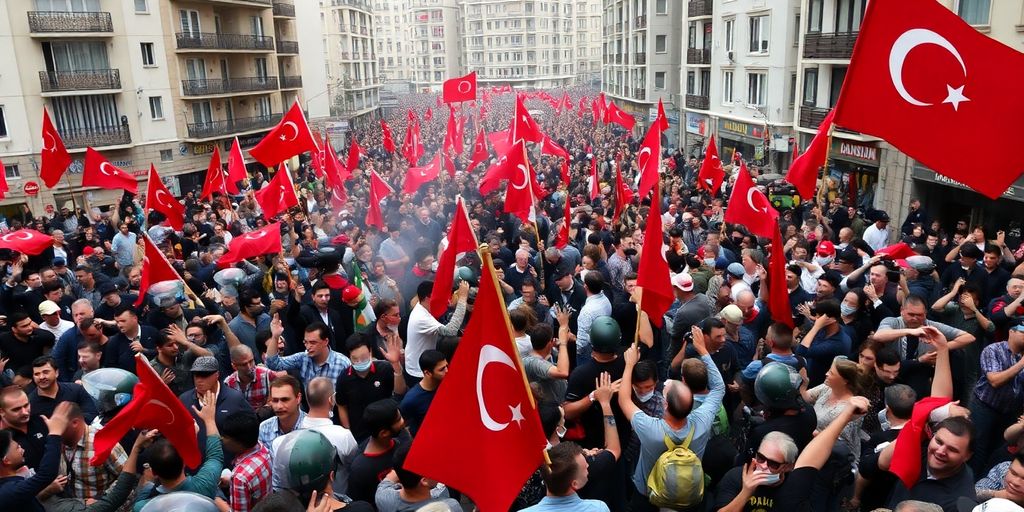Hundreds of thousands of protesters took to the streets of Istanbul and other cities across Turkey in response to the arrest of Istanbul Mayor Ekrem Imamoglu. His detention on corruption charges has ignited one of the largest anti-government demonstrations in recent years, signaling widespread discontent with President Recep Tayyip Erdogan’s administration.
Key Takeaways
- Protests Sparked by Arrest: Imamoglu’s arrest on March 19 led to nationwide protests, with estimates of up to 2.2 million participants in Istanbul alone.
- Political Motivations Alleged: Many believe the charges against Imamoglu are politically motivated, aimed at eliminating a significant rival to Erdogan.
- Government Crackdown: Nearly 2,000 people have been detained during the protests, including journalists and opposition members.
- Economic Discontent: The protests are fueled not only by political grievances but also by a worsening economic situation in Turkey.
Background of the Protests
Ekrem Imamoglu, a prominent figure in the opposition Republican People’s Party (CHP), was arrested on charges of corruption and terrorism, which many view as a tactic to suppress dissent. His popularity as a potential presidential candidate has made him a target for Erdogan’s government, which has been accused of increasingly authoritarian practices.
The protests began in Istanbul but quickly spread to other cities, with demonstrators calling for justice and freedom. Protesters waved Turkish flags and chanted slogans demanding rights, law, and justice, reflecting a broader desire for democratic reforms in the country.
Scale of the Demonstrations
The scale of the protests has been unprecedented in recent years, with reports indicating that:
- 2.2 Million people participated in the Istanbul rally alone.
- 1,900 individuals have been detained since the protests began, including journalists and activists.
- 260 of those detained are currently held pending trial.
Government Response
In response to the protests, President Erdogan has dismissed the demonstrators as marginal groups and labeled the protests as a form of street terrorism. The government has also intensified its crackdown on media coverage, with several journalists being detained or deported for reporting on the events.
Interior Minister Ali Yerlikaya stated that the government would not tolerate what it perceives as provocations, and has warned of legal consequences for protesters. This heavy-handed approach has raised concerns among human rights organizations and foreign governments about the state of democracy and freedom of expression in Turkey.
Economic Factors at Play
The protests are not solely about Imamoglu’s arrest; they also reflect deep-seated economic frustrations. Turkey has been grappling with high inflation rates, which reached 42% in January, and a depreciating currency that has made life increasingly difficult for many citizens. The economic crisis has exacerbated public discontent, leading to a convergence of political and economic grievances among the populace.
Future Implications
As the protests continue, the CHP has vowed to maintain pressure on the government until Imamoglu is released and allowed to run for office. The situation remains fluid, with the potential for further unrest as citizens express their dissatisfaction with the current regime. The outcome of these protests could significantly impact Turkey’s political landscape, especially with elections approaching in 2028.
In conclusion, the mass protests in Turkey represent a critical moment for the country’s democracy, as citizens rally against perceived injustices and demand accountability from their leaders. The coming weeks will be crucial in determining whether the opposition can sustain this momentum and challenge Erdogan’s long-standing grip on power.
Sources
- Hundreds of thousands join growing Istanbul protest – DW – 03/29/2025, DW.
- Turkey detains nearly 1,900 in protests over jailed mayor, rejects foreign criticism, Reuters.
- Pro-democracy demonstrators return to Istanbul’s streets for huge rally, BBC.
- Turkey’s opposition mobilizes huge crowd to protest jailing of Istanbul mayor – POLITICO, POLITICO.eu.
- Turkey’s mass protests target Erdogan’s grip on power – DW – 03/30/2025, DW.






